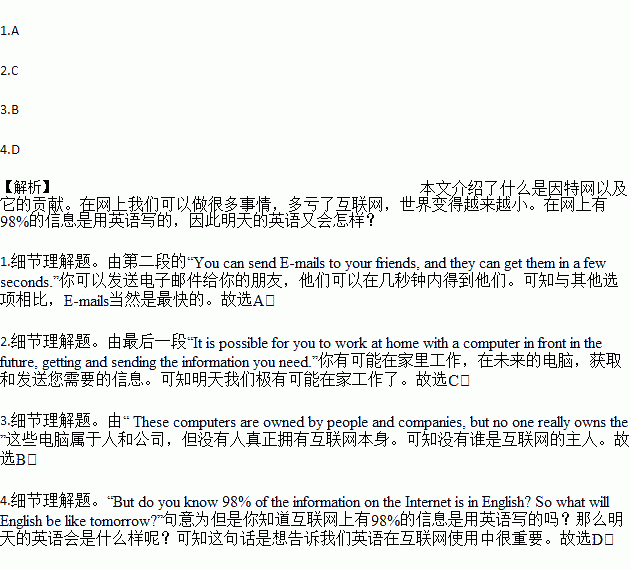ÌâÄ¿ÄÚÈÝ
Perhaps you have heard a lot about the Internet, but what is it, do you know? The Internet is a network. It uses the telephone to join millions of computers together around the world.
Maybe that doesn¡¯t sound very interesting. But when you¡¯ve joined to the Internet, there are lots and lots of things you can do. You can send E-mails to your friends, and they can get them in a few seconds. You can also do with all kinds of information on the World Wide Web (WWW).
There are many different kinds of computers now. They all can be joined to the Internet. Most of them are small machines sitting on people¡¯s desks at home, but there are still many others in schools, offices or large companies. These computers are owned by people and companies, but no one really owns the Internet itself.
There are lots of places for you to go into the Internet. For example, your school may have the Internet. You can use it during lessons or free time. Libraries often have computers joined to the Internet. You are welcome to use it at only time.
Thanks to the Internet, the world is becoming smaller and smaller. It is possible for you to work at home with a computer in front in the future, getting and sending the information you need. You can buy or sell whatever you want by the Internet. But do you know 98% of the information on the Internet is in English? So what will English be like tomorrow?
1.Which is probably the quickest way to send messages to your friends?
A. By E-mail. B. By post.
C. By telephone. D. By satellite.
2.Which may be the most possible place for people to work in the future?
A. In the office. B. At school.
C. At home. D. In the company.
3.Whose the owner of the Internet?
A. The headmaster. B. No one.
C. The user. D. The officer.
4.What does the writer try to tell us with the last two sentences?
A. Every computer must have the Internet.
B. the Internet is more and more popular.
C. Most of the information is in English.
D. English plays an important part in using the Internet.
 ÆÚÄ©¸´Ï°¼ì²âϵÁдð°¸
ÆÚÄ©¸´Ï°¼ì²âϵÁдð°¸ ³¬ÄÜѧµäµ¥ÔªÆÚÖÐÆÚĩרÌâ³å´Ì100·ÖϵÁдð°¸
³¬ÄÜѧµäµ¥ÔªÆÚÖÐÆÚĩרÌâ³å´Ì100·ÖϵÁдð°¸ »Æ¸Ô360¶È¶¨ÖÆÃܾíϵÁдð°¸
»Æ¸Ô360¶È¶¨ÖÆÃܾíϵÁдð°¸ Ñô¹â¿¼³¡µ¥Ôª²âÊÔ¾íϵÁдð°¸
Ñô¹â¿¼³¡µ¥Ôª²âÊÔ¾íϵÁдð°¸
